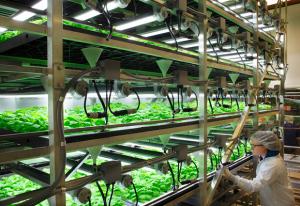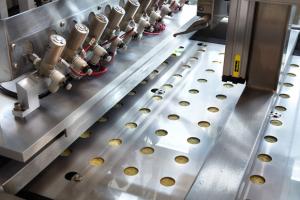Fraunhofer: Looking for the medicine in marijuana
Nearly 70 people attended the state’s mandatory pre-bid meeting for those interested in opening medical marijuana distribution centers in Kent and Sussex counties.
Groups representing all three counties were present, and representatives from companies as far away as California attended.
That said, there was no more interesting a group represented at the meeting than Fraunhofer USA, a multinational research institute with a branch in Newark.
Immediately following the meeting, Dale Ervin, a Fraunhofer USA representative, said the nonprofit research center has no interest in opening a distribution location. Instead, she continued, it’s the science they’re interested in researching.
The state agrees more research into marijuana’s medicinal uses is necessary. Last July, Gov. Jack Markell signed a law allowing “research studies that include “demonstrations of safety and efficacy for treatment of medical conditions that often fail to respond to conventional treatment.”
In a follow-up email, Ervin explained Fraunhofer’s interest. Many medicines are derived from plants, and the marijuana plant is composed of numerous compounds, she said.
“While there is much anecdotal evidence on the efficacy of marijuana for certain indications, we do not know which of the compounds in the plant may actually be active ingredients,” she wrote. “Research also needs to be done to determine safety, efficacy dosage, formulation.”
Who is Fraunhofer USA and what do they do?
While Fraunhofer may be interested in the future of marijuana research, the company is already well-established in the research field.
Fraunhofer USA is a group of seven nonprofit applied-research and development centers around the country that work for government and industry. Fraunhofer USA is a subsidiary of the German-based Fraunhofer-Gesellschaft, a world leader in applied research and development with more than five dozen research institutes.
One of the U.S.-based research centers, called the Fraunhofer Center for Molecular Biotechnology, has been in Delaware since the early 2000s and, in 2010, built a 56,000-square-foot facility in Newark. The main focus of work at the center is using plant-based systems for new vaccines. In 2014 alone, the facility in Newark worked on a malaria transmission-blocking vaccine, anthrax, yellow fever and Ebola.
Vidadi Yusibov is the executive director for the center in Newark. During a visit to the facility, he explained the benefits of using plants to create vaccines compared to the traditional method using eggs. He said eggs require a cumbersome and involved process that’s still being used because “that’s the way people are used to doing it.”
Yusibov said using plants is faster and cheaper than using eggs. He said it takes nine months to get from strain to vaccine using an egg, while using a plant, it takes just weeks. One egg produces a single vaccine dose, he said, while a single plant produces 10.
Also, he said, in order for a vaccine to survive in an egg it has to adapt, which can lead to inconsistencies.
The plant of choice at Fraunhofer is a variation of the tobacco plant called nicotiana benthamiana. Ervin said it’s a plant that grows quickly and predictably.
From the automatic seeder to the growth racks and the homogenizer (a giant juicer), everything about the process is cutting edge. Yusibov said there are only two other facilities in the country doing this work – one in Kentucky and one in North Carolina.
The vaccine is introduced to the plant through what is called a vacuum infiltration chamber. Yusibov did his best job explaining the process in basic terms. When the plants are about 5 inches tall, the rack is dunked upside down into a liquid bath with a specific vaccine in it. All of the air in the plant is pulled out when the vacuum is turned on.
When the vacuum is turned off, said Yusibov, the plants take a deep breath and inhale the liquid. Then the vaccine is allowed to reproduce for up to a week before being harvested and put in the homogenizer to be separated. From there, highly trained scientists at the facility turn the plant soup into usable vaccines.
State-encouraged research
The citizens of Delaware have a vested interest in seeing Fraunhofer succeed – since Fiscal Year 2002, Fraunhofer has received just over $23.5 million from the Delaware Economic Development Office.
Christina Dirksen, DEDO spokeswoman, said the majority of the money has been authorized by the General Assembly through the bond bill and there has also been additional support from the Delaware Strategic Fund, a program that provides low-interest loans and grants to businesses for job creation, relocation, expansion and brownfield redevelopment.
Fraunhofer employs about 85 people at its Newark research facility, but, said Dirksen, the state receives 10 percent of net income from intellectual property developed through 2021.
Dirksen said the grant to Fraunhofer is a matching grant which generates additional revenue from the government, industry and foundations. Since 2006, Fraunhofer has generated $113 million for research contracts within Delaware, she said.
Being home to a world-class research facility also promotes Delaware as a welcoming location for science-based businesses.
The annual Fraunhofer-hosted New Technologies, New Vaccines conference brings those businesses from around the world to Delaware, said Dirksen. She estimated the conferences have generated nearly $1 million worth of investment to the local economy.
Possible expansion?
After more than a decade of research and development, and the successful completion of a handful of clinical trials, Fraunhofer has moved forward with a for-profit entity called Fourth Dimension.
The facility in Newark is capable of making about 3 million vaccine doses per month, which, Yusibov said, is not a lot.
Yusibov was hesitant to discuss particulars, only confirming the creation of the company and that it is considering expansion within the state. It’s still in the exploratory stage; there’s no business plan at this point, he said.
Gordon C. Johnson is an assistant professor and specialist in plant and soil science at the University of Delaware’s Carvel Research and Education Center in Georgetown. He said if Fraunhofer were to expand, Sussex County would make a good home.
“I couldn’t think of any friendlier place,” he said.
First, explained Johnson, there must be enough space to build large greenhouses, which Sussex County has.
Second, there’s a lot of misunderstanding about the biotechnology field, but, he said, there’s a large population of Sussex Countians who understand its possibilities because its technology being used by the area’s farms in their fields today.
When asked specifically if Sussex County could facilitate the company’s needs, Yusibov said there are some advantages, but they’ll be examining the availability of talent, space requirements and ensuring reliable utilities are available.
“It’s a business decision,” he said. “But it would be nice being close to the beach.”
Chris Flood has been working for the Cape Gazette since early 2014. He currently covers Rehoboth Beach and Henlopen Acres, but has also covered Dewey Beach and the state government. He covers environmental stories, business stories and random stories on subjects he finds interesting, and he also writes a column called Choppin’ Wood that runs every other week. He’s a graduate of the University of Maine and the Landing School of Boat Building & Design.




















































